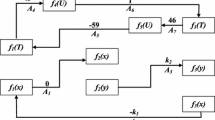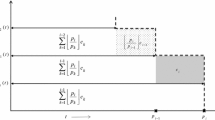Abstract
The problem of scheduling weakly hard real-time tasks is addressed in this paper. The paper first analyzes the characters of μ-pattern and weakly hard real-time constraints, then, presents two scheduling algorithms, Meet Any Algorithm and Meet Row Algorithm, for weakly hard real-time systems. Different from traditional algorithms used to guarantee deadlines, Meet Any Algorithm and Meet Row Algorithm can guarantee both deadlines and constraints. Meet Any Algorithm and Meet Row Algorithm try to find out the probabilities of tasks breaking constraints and increase task’s priority in advance, but not till the last moment. Simulation results show that these two algorithms are better than other scheduling algorithms dealing with constraints and can largely decrease worst-case computation time of real-time tasks.
Similar content being viewed by others
Explore related subjects
Discover the latest articles, news and stories from top researchers in related subjects.References
Bernat G, Burns A, Llamosi A. Weakly hard real-time systems.IEEE Trans. Computers, 2001, 50(4): 308–330.
Bernat G, Burns A. Specification and analysis of weakly hard real-time systems [Dissertation]. Department de Ciencies Matematiques Informatica, Universitat de les Illes Balears, Spain, Jan. 1998.
Bernat G, Burns A. Weakly-hard temporal constraints. Technical Report YCS, Dept. Computer Science, Univ. York, 2000.
Bernat G, Burns A. Combining (nm)-hard deadlines with dual priority scheduling. InProc. 18th IEEE Real-Time Systems Symposium, San Francisco, USA, Dec. 1997, pp.46–57.
Hamdaoui M, Ramanathan P. A dynamic priority assignment technique for streams with (m,k)-firm dendlines.IEEE Trans. Computers, Dec. 1995, 44(12): 1443–1451.
West R, Poellabauer G. Analysis of a window-constrained scheduler for real-time and best-effort packet streams. InProc. 21st IEEE Real-Time Systems Symposium, Orlando, FL, Nov. 2000, pp.239–248.
Wedde H, Lind J. Building large, complex, distributed safety-critical operating systems.Real-Time Systems, 1997, 13: 277–302.
Bernat G, Cayssials R. Guaranteed on-line weakly hard real-time systems. InProc. 22nd IEEE Real-Time Systems Symposium, London, England, Dec. 2001.
Liu C L, Layland J W. Scheduling algorithms for multiprogramming in a hard-real-time environment.Journal of ACM. 1973, 20(1): 46–61.
Author information
Authors and Affiliations
Corresponding author
Additional information
TU Gang received his M.S. degree in computer science from Huazhong University of Science and Technology (HUST) in 2001. Now he is a Ph.D. candidate in Institute of Computer Science, HUST. His research interests are real-time scheduling algorithms and embedded real-time systems.
YANG FuMin is a professor of Huazhong University of Science and Technology. He received his M.S. degree in computer science from HUST in 1989. Currently, he is the head of Embedded Real-Time Operating System Lab of HUST. His research interests cover real-time systems, embedded systems and DBMS.
LU YanSheng is a professor and Ph.D. supervisor of Huazhong University of Science and Technology. He received his M.S. degree in computer science from HUST in 1985. Currently, he is the head of the Institute of Software of HUST. His research interests cover real-time systems, real-time DBMS and data mining.
Rights and permissions
About this article
Cite this article
Tu, G., Yang, F. & Lu, Y. Scheduling algorithms based on weakly hard real-time constraints. J. Comput. Sci. & Technol. 18, 815–821 (2003). https://doi.org/10.1007/BF02945471
Received:
Revised:
Issue Date:
DOI: https://doi.org/10.1007/BF02945471




